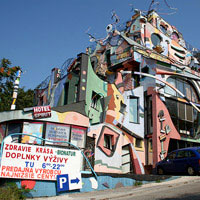|
ONLINE SURFING Fake travel reviewsThat user review could be from a child or a CEO. This places travellers in a quandary. Whom can you trust? How hotels and travellers are fighting back. SEE ALSO Child friendly resorts | Amazing holidays | Medical tourism | Best travel sites | Biggest travel gripes | Concierge travails | Round the world fares | What hotel guests steal 
Call this a hotel? Yes, in Bratislava AFTER hours of trawling the best prices, comparing online reviews and consulting go-to travel guides, seasoned travellers Jarett Goldman, Kate Berry and Magda Kotek found the perfect hotel for a weekend in Sanya, China. The place had a five-star rating with free WiFi, welcome drinks, complimentary breakfast buffet, a hot tub, clean surrounds and a convenient location. What more could they ask? They booked a package with Agoda. Perfect. “The first red flag at the Aegean Conifer was the pool water,” Berry says. “As we walked by, I noticed it was really dirty.” Then the fun began. Grime. Mould. Odd smells. Dirty utensils. Bugs. No air-conditioning. Yellow water. And a bed that “was like sleeping on a countertop”. The trio weighed its options and booked another hotel. Happily ensconced at a nearby luxury resort, they could finally relax. Ahh… Perfect. Early morning housekeeping staff barged in and presented a startled Goldman with a service evaluation form. It had to be done right away they said. Goldman rubbed his eyes in bed and blinked. Send us your Feedback / Letter to the Editor In the annals of Asian travel, such misadventures are common. Turn to anyone, and they’ll have a horror story of their own having booked a hotel based on anonymous user-generated reviews. According to research from Olery, an Amsterdam-based market intelligence agency, 49 percent of travellers say they won’t book a hotel without reading reviews first, and 81 percent say they find user reviews important. So which reviews to pick? In the US, an average traveller spends 21 days selecting a destination, using a combination of search engines, online travel agents, and recommendations from his social network, according to a 2012 study by PhoCusWright, a travel technology firm that surveyed 4,500 global travellers. Roughly 60 percent complained about booking processes, including the time it took to surf the Web, information overload, and uncertainty over whether they’d found the best deal. {In the US, an average traveller spends 21 days selecting a destination, using a combination of search engines and online travel agents This stress is partly due to the mass adoption of user-generated recommendation sites. According to Olery, the average number of reviews received by hotels per year has exploded from two in 2002, to an estimated 465 in 2012. TripAdvisor alone hosts more than 75 million opinions and sees 60 million visitors a month. The lack of stringent vetting and a free-for-all posting platform causes the reviews to fluctuate wildly from deliriously positive to diabolical. It’s reasonable to expect those who have received fantastic or terrible service have the impetus to share their experience, but writing online reviews is too easy. Any novice Web troll can post ad nauseum without signing a name or even proving the authenticity of a stay. Bulk opinions may reveal interesting trends and a somewhat accurate portrayal of a property at the bird’s-eye level when viewed by saner sorts, but the advice too often comes from less travelled sophomores and kids. Opinions count of course but there is a huge difference in the value of each perception. The vast majority of reviewers (75 percent) fall between the ages of 25 and 49, according to Olery. These users – 30 percent of whom are between 25 and 34 – generally lack the travel experience to offer discerning perspectives. Sometimes, less is more. Whether it’s a glossy magazine, travel agency or an online connoisseur, reviews from travel professionals are far more reliable than those from anonymous scribes — in the same way a doctor’s diagnosis is more valuable and relevant for an ill person than advice from some random rollerblading kid. That’s not to say journalists and travel agents are performing heart surgery, nor that you won’t come across the occasional quack, but professional reviewers have seen it all and are trained to tell it straight. Comments are powerful, strongly influencing a traveller’s decision. This has prompted hotels to take matters into their own hands. Earlier this year, Carlton Hotel Group, an Irish group with several properties, made headlines when a company e-mail surfaced encouraging employees to post fake reviews on TripAdvisor. The hotel group claims the policy was never implemented. “To date I have requested 24 TA [TripAdvisor] posters to write reviews and only 11 have responded to my e-mails,” wrote the sender of this particular naughty note, as The Irish Times reports. This is just one of many similar cases. You may also recall reading about Ireland’s Clare Inn, a hotel in the Lynch Hotel Group that was caught tinkering with its online ratings in 2010, according to the Independent. Investigations by researchers at Yale, Dartmouth and the University of California have brought rogue reviews to our attention. As reported by Slate earlier this summer, the Yale study compared hotels on two sites, TripAdvisor and Expedia. On TripAdvisor, anyone can post, but on Expedia, you must book through the site in order to add your two cents. The barrier to entry, understandably, results in “more reliable” reviews on Expedia. They found that hotel owners (especially independent hotels) are 10 percent more likely to get five-star reviews on TripAdvisor than they are on Expedia. Smaller properties are also more likely to post false reviews, as well as cut down the competition. {Online reputation management company KwickCheck, says between five and 10 million reviews on TripAdvisor could be fake An article in the Daily Mail early 2012 quoted Chris Emmins, co-founder of online reputation management company KwickCheck, claiming that between five and 10 million user reviews on TripAdvisor could be fake. The company also came out with its own ranking system in June, which puts Booking.com at the top and Yelp at the bottom (largely on account of its anonymous reviews). Anonymity is a sticky point with KwickCheck, in part because Cornell University last year found it exceedingly difficult for humans to spot honest reviews. According to the study, the average person can only spot fakes at a rate of 50 percent, while software (developed by the research team) is much more precise. The researchers trained the system to detect the differences, and then tested the programme against 400 truthful reviews and 400 deceptive reviews of Chicago hotels. It flagged falsies at an astonishing rate of 90 percent. Unauthentic online reviews can toss unsuspecting travellers into an unsolicited misadventure, but hotels arguably have it the worst. Where travellers go, hotels must follow, and the rise of anonymous reviews has left many properties flummoxed — even after revamping customer service models, stalking TripAdvisor reviews, monitoring rankings across a dozen sites and keeping up with social media channels. “We customise every response and invite guests to contact us directly via e-mail,” says Michelle Wan, director of public relations at the Four Seasons Hotel Singapore. “But sometimes you look at a critique and it is two days old. How come there’s no response? You may think that there is a response lag, but actually it can take two to three days to post, which can reflect negatively on the hotel”. Hotels also feel they must play the ranking and review game. When the Opposite House in Beijing arbitrarily dropped 10 spots on TripAdvisor, general manager Anthony Ross was dumbfounded. He wrote to TripAdvisor a couple of times to voice his concerns, but never received any explanation other than an accusation that his hotel had posted false reviews. “We are not manipulating the data, we don't ask people to write reviews, and it’s really dangerous playing with people’s businesses,” Ross says. “It sounds like sour grapes, but I know other boutique hotels that have been busy writing their own reviews for years. You can see it if you look in Beijing, where 500 opinions appear during the same time period. We don’t play that game”. Similarly, the InterContinental Bangkok’s general manager Markus Plazer says the hotel took a dive for no apparent reason. The InterCon was in the top three, and then fell out of the top 10 seemingly overnight. After some time, the hotel has dug its way back onto the front page, but not without some elbow grease. Plazer says the concierge hands out TripAdvisor cards when guests check out. “It’s a big deal and the only way to move up is to have a higher quantity of positive reviews,” he says. Of course, there is also the worry that negative remarks will also find their way onto the web. “Guests can make videos with their mobile phones, capture every nook and cranny just because they can,” Plazer says. “It’s scary”. Plazer hasn’t lost his personal touch though. He doesn’t just reply to online reviews, he picks up the phone and calls. “It is unexpected but works every time,” he says. {This General Manager doesn’t just reply to online reviews, he picks up the phone and calls. “It is unexpected but works every time.” Sometimes travellers opt to avoid confronting the hotel and go straight online with a damaging post. Even while they’re still checked in. “People like me remember what it used to be like before the internet came along, when a customer had a complaint, it was raised and promptly dealt with,” says George Benney, managing director of the Regent Beijing. “But now, people just go online and vent their spleen”. Benney, who employs a full-time e-commerce manager to monitor the internet all the time, says he remembers a specific instance when a couple had a spa treatment. Apparently, the couple did not appreciate the women who were chatting as they worked and wrote a comment on TripAdvisor before complaining to the hotel. “They were completely valid to expect a more serene spa experience, but instead of picking up the phone and asking to talk to the manager they went about it indirectly,” says Benney. “To me, it’s very sad if you only want to complain without trying to find a solution.” Of course, it’s not all rough sailing. Clement Koh, GHM’s vice president of sales and marketing, says that the hotel group has been fortunate to receive a great many genuine reviews over the years. Says Koh, “There was one instance of a fake review for one of our hotels. It was identified from the style of writing, the content of the post and checking the user’s reviews for other hotels, which seemed too oddly similar.” But the property’s general manager reported the post and within days, TripAdvisor removed it. Many brands look at TripAdvisor as a kind of quality-control assistant, enabling properties to tap into customer concerns and improve their products. Katherine Anthony, public relations director at the Conrad Maldives, says she is active not only in replying to reviews, but also in the forum conversations. “Hotels are still a bit suspicious of social media,” Anthony says. “People will be honest and you may not be always happy with what they’re saying, but as long as what they’re saying is accurate, it’s an extremely good way to make adjustments and address problems rather than let them disappear”. Singapore Airlines spokesman Nicholas Ionides says the company takes feedback from sites such as RouteHappy, TripAdvisor forums and social media very seriously. “We are not too proud to realise that there's always something we can learn from our customers,” he says. “We are always adapting ways we do things, and in the bigger picture, feedback reveals specific areas that we need to improve upon, developing trends and the interests of travellers.” Despite all the pitfalls, user-generated reviews are still wildly popular among travellers and even industry professionals. Common sense is your best weapon. Step back to acquire perspective and don’t leap into someone else’s “picture postcard”. You may regret it. But then, even luxury hotels, as our readers have discovered, may be too hasty with the wake-up call and the eagerly thrust evaluation forms. Some tips for road warriors. Diversify your search: Don’t rely solely on user generated online review sites. Compare with other resources, such as independent guides, reputable magazines, travel agents and referrals. Balance it out: Discount the over-the-top positive and negative reviews. Look for comments that seem fair and contain specific details about the property. Watch the timeline: If there has been a sudden influx of positive or negative reviews, you may want to move on. If the reviews are consistent over a period of time, you have probably found a safe bet. Watch the wording: Be suspicious if you see too many exclamation points, superlatives or repetition. Check hotel responses: No matter how dreamy a place is, there will always be one or two bad reviews. How did the hotel respond to the guest’s experience? Are you seeing stars? It also important to keep in mind that a five-star review online is not the same as an accredited five-star from the tourism body in the destination’s country. Stars are sometimes handed out randomly, or for a fee. How and where to fight back: In 2010, UK watchdog Advertising Standards Authority (ASA) ordered TripAdvisor to stop claiming that its reviews were “honest”. TripAdvisor has since removed its slogan, "world's most trusted travel advice," from its banner. On the other side of the world, the Accommodation Association of Australia has voiced frustration about assorted misdeeds. According to The Herald Sun, the AAA is conducting a survey of hoteliers to assess TripAdvisor’s effect on operators. Several feisty blogs and columns fight a valiant rearguard action. Look for TripAdvisor Watch, an undercover investigation from The Dallas Morning News, and research on paid review trends reported by BusinessInsider.
NOTE: Telephone and fax numbers, e-mails, website addresses, rates and other details may change or get dated. Please check with your dealer/agent/service-provider or directly with the parties concerned. SmartTravel Asia accepts no responsibility for any inadvertent inaccuracies in this article. Links to websites are provided for the viewer's convenience. SmartTravel Asia accepts no responsibility for content on linked websites or any viruses or malicious programs that may reside therein. Linked website content is neither vetted nor endorsed by SmartTravelAsia. Please read our Terms & Conditions. |


